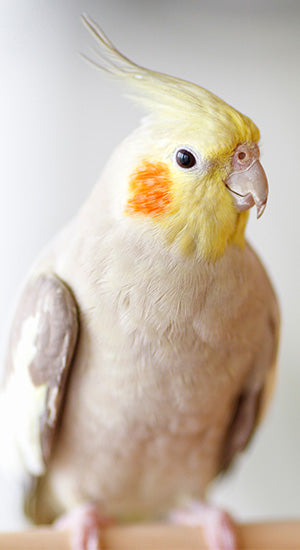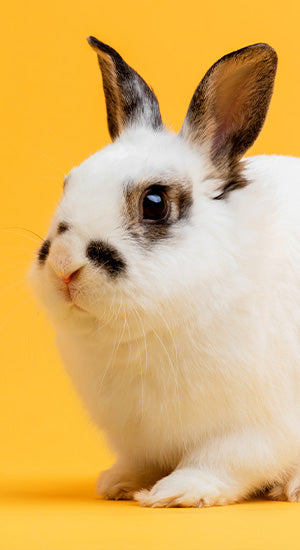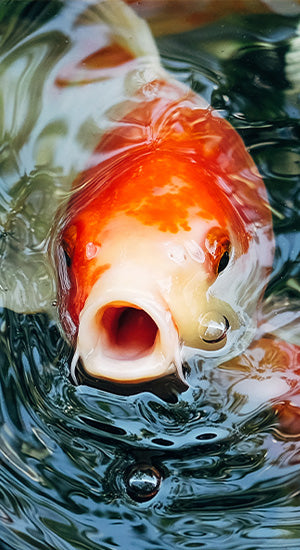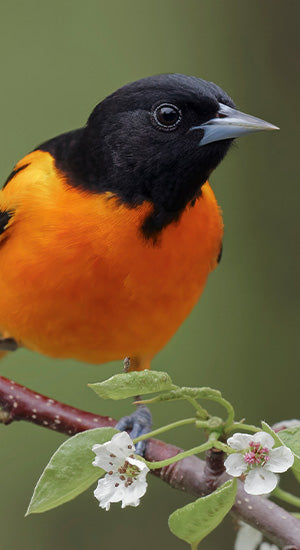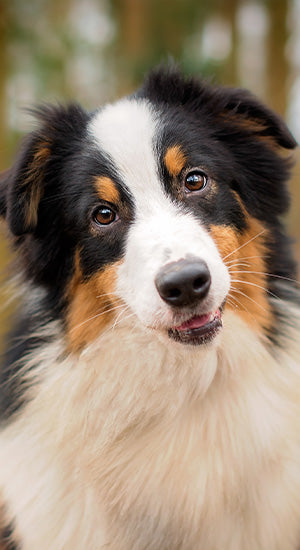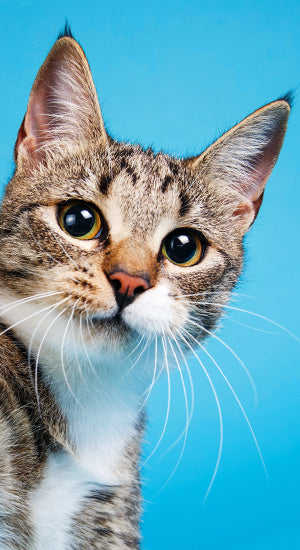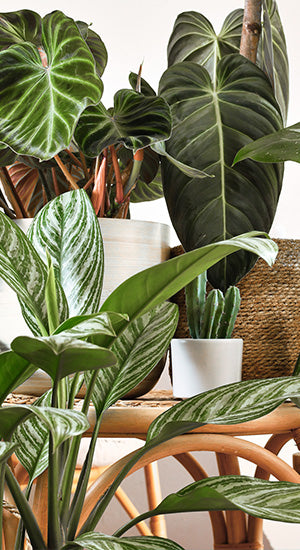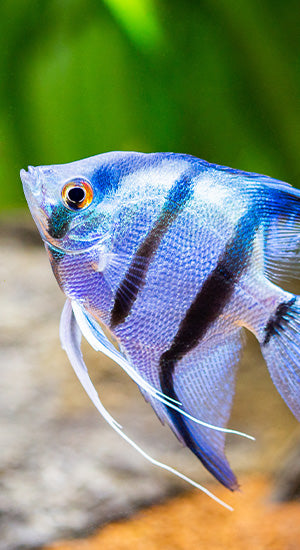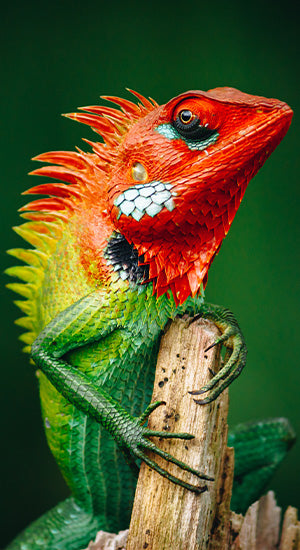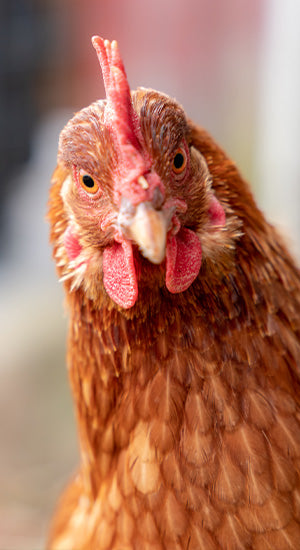Wing Clipping: Everything You Need To Know
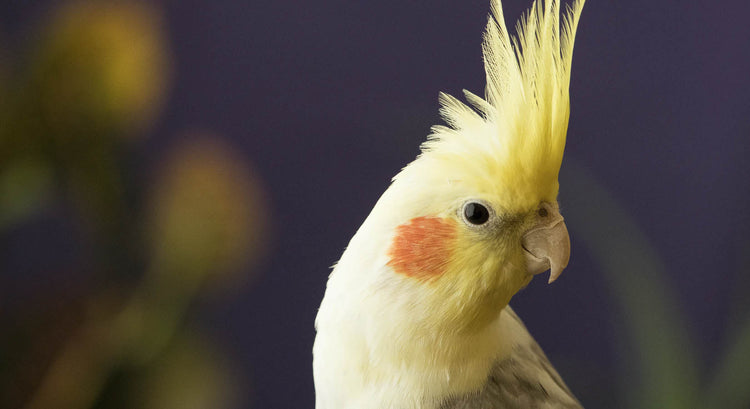
Reviewed By Dr. Shawn Tucker, Doctor of Veterinary Medicine
What Is Wing Clipping?
Wing clipping is when the outermost primary flight feathers are cut shorter so that the bird temporarily cannot fly. You can clip in line with the primary coverts or do what's called a “long clip” which is when you clip the same number of feathers, but farther from the primary coverts. Long clips are often done for birds that are clumsy or have poor balance because it allows the bird to glide a farther distance before reaching the floor. You can also do a Show Clip, which is when you leave the outside feathers so that the bird looks flighted but is actually clipped. Wing clipping is not permanent and must be repeated at least once a year when birds molt and grow new flight feathers.
Clipping Is Not The Same As Pinioning Or Tendonotomy
The Pinion is the outer part of a birds wing that contains the primary flight feathers. Pinioning is a surgical procedure performed on a bird's wing to render the bird permanently incapable of flight. The operation typically involves amputation of that part of the wingtip (pinion) from which the flight (primary) feathers grow by severing the second and third metacarpal bones. Tendonotomy involves the removal of part of a tendon from a wing causing reduced flying ability, but leaving the bird fully feathered. Neither one of these are even similar to wing clipping but people often believe that they mean the same thing.
Wing Clipping:
Common Misconceptions
#1 It Hurts The Bird
There is an endless amount of controversy over whether or not wing clipping harms the bird. I can confidently say that it does not, and here’s why. Feathers do not have nerve endings and therefore cannot feel pain when cut. Feathers grow in shafts that supply blood until the feather is finished growing. Once this process is complete, the blood supply site is sealed and the feather itself becomes ‘dead’ and no longer receives anything from the rest of the body. That being said, we know that the process of clipping wings feels the same as us cutting our nails or hair. But if clipping doesn’t hurt, why do birds throw a fit when we clip them? The simple answer: birds are dramatic. (Like this kid who doesn't want his hair cut)

#2 Clipped Birds Can't Build Muscle
Have you ever noticed your bird flapping its wings like it wants to fly but it holds onto the cage bars so that it doesn't actually lift off? Or maybe you get your bird to perch on your finger and then move your arm up and down while they flap? That's the bird equivalent of running on a treadmill instead of walking around the block. Even flighted birds will fly in place instead of moving around the house. Why? Because actually flying is tiring and our pets are as lazy as we have been while self-isolating. Sure, they want to do a lap around the block but walking back and forth from the kitchen to the couch will probably take the same amount of steps right?
Your bird can stay fit and strong even with clipped wings because their actual ability to fly doesn't play a role in their decision to use the treadmill instead of walking around the block.
#3 The Feathers Will Never Grow Back
There is a common misconception that a clipped bird will never be able to fly again. Birds molt at least once a year. This means that they will lose all of their feathers and grow new ones throughout their entire life. Once a feather is done growing, it seals the connection between the blood supply and the quill. After this, there is no way for the feather to repair any future damage because it no longer has access to the rest of the body. This is why a bird needs to have it’s feathers clipped multiple times a year - they grow back. This is also why birds with black feathers (too much oil in diet) take so long to regain the colour in their plumage - They have to molt the bad feathers and grow new, healthy ones. New feathers are commonly called Pin Feathers or Pinnies and are the reason birds preen themselves - to get the feather out of the sheath.
#4 A Bird Will Start Plucking/Mutilating
People believe that clipping a bird's wings will cause them to pluck or mutilate their feathers. Skin and feather disorders have a long list of possible causes, none of which point to wing clipping. Yes, one of the most common causes for feather plucking is stress, but if your groomer is doing their job correctly, clipping isn’t a very stressful experience. For the bird, the towel is scarier than the actual grooming. Skin and feather disorders can be from physical ailments such as parasites, diseases, allergies, etc. or psychological issues like boredom, sexual frustration and stress. Malnutrition can also cause feather picking as well as environmental issues like not having access to enough baths. Other factors that can contribute to behavioral feather damage include territoriality, compulsive behavior, predator stress from household pets, and lack of parental training for preening. The only instance that would cause a bird to self-mutilate because of their wing clipping is if the feathers were clipped incorrectly and are causing irritation or pain. Only have your bird’s wings clipped by a professional that you trust.
Benefits Of Clipping Your Birds Wings
If you decide to clip your birds wings, we suggest that you bring them to a groomer or professional that you trust to do it for you. Even if you know how to do it yourself, it's better for your bird to be angry at the groomer than at you. After all, birds love to hold grudges. After the grooming is done and your bird goes back to you, they see you as a rescuer which improves your bond.
Another benefit to clipping your birds wings is that they will rely on you for transport. Even though they are completely capable of walking from the cage to the couch, they are very lazy. It is much easier to build a bond and a relationship with your bird when they don't insist on being completely independent (which flighted birds do, in fact, insist upon).
Situations Where Clipping Is A Good Idea
Taming & Training
Whether you're taming a wild bird or training your pet, having them clipped first will make the process a lot easier. Trying to tame a wild or aggressive bird while it is still fully flighted will probably result in one of three ways: They will fly away whenever you go near them; They will bite you whenever you go near them; Or they will dive bomb. While the first two may be manageable, dive bombing may make taming a bit more difficult since you'll be shielding your face for most of the lesson. (I wish I was joking)
Training a tame bird comes with a different set of problems when fully flighted. One of the biggest issues that arises with a fully flighted bird is attitude. A fully flighted bird has the same attitude that a rebellious teenager has - only, they also have a beak and claws. Clipping your birds wings has the same effect as taking the keys away from your sassy teen - they will still be able to get from here to there but they'll remember that you're in charge and drop the attitude pretty quickly.
Multiple Birds In A Household
If you have more than one bird it is strongly advised that you keep them clipped. Many bird species only bond to one person so when that bird sees you with another bird they get angry. If given the opportunity, your sweet bird can turn into a savage and try to hurt the other. Some birds are also very territorial of their cage and will defend said territory if another bird goes into/onto it. Here are a few examples I've personally heard about:
Bird A flies onto bird B's cage and bird A no longer has an upper mandible(beak).
Bird A flies onto bird B's cage and no longer has all of it's toes.
Bird A flies into bird B's cage and is killed by bird B
Bird Is Aggressive and/or Hormonal
Aggressive birds should always be clipped to avoid injury to people and/or other birds (remember dive bombing?). Aggressive birds may also feel superior when fully flighted which will not help in your attempt to make them less aggressive.
All birds get hormonal but it's easier to avoid injury when the bird can't fly after you for changing their water because it was dirty. Just Saying.
Bird Doesn't Like Someone In Household
I know I sound like a broken record but if your bird doesn't like someone in the house and they are fully flighted they will 100% dive bomb that person. If your bird isn't much into flying they will instead find a way to the floor and run to the person that they don't like (Gria the Caique when she sees any men). In this situation, keeping the bird clipped is still a good idea to minimize the attitude.
Bird Goes Outside A Lot
Bird's go missing every day because people like to bring them outside on sunny days and then they get spooked and fly off. I'm not saying you shouldn't bring them outside because you definitely should - but only under the right circumstances: They are on a harness; They are in a travel carrier; Or they are clipped and also either wearing a harness or are in a travel carrier. Remember that Hawks and other birds have been brave enough to grab parrots right from the owners shoulders so if you choose to take your bird outside on your shoulder be extremely careful!
It is also extremely dangerous for your bird to be outside if it escapes and doesn't come back. Pet birds have never experienced life in the wild - they don't know how to find food or shelter, they can't defend themselves, and here in Canada, they can't survive the colder weather.
Household Dangers
But what if nothing you just read applies to you? What if your bird doesn't go outside unless it's in a carrier and doesn't have an attitude and likes everyone in the house? There is one thing that no bird or bird owner can disagree with: Flying into a toilet, stove or window is not fun.
Flying into a toilet can be fatal if the bird inhales the water or is not rescued quickly. On the bright side you can tell the boys in the house that your birds life depends on them keeping the toilet seat down.
Flying into a stove or other hot surface is also going to hurt your bird. Even a clipped bird can fly if they are strong or light enough so lock your birds in their cages before cooking!
Windows are also very dangerous because your very smart bird doesn't understand that there is, in fact, a barrier between them and the outside. Even after hitting said window they will still try to fly through it.
During the warmer months you may decide to turn on the ceiling fan to feel that cool breeze. Only do so if your bird is clipped and/or locked in their cage to avoid injury.
Situations Where Clipping Can Be Optional (Use Your Judgement)
Breeder Birds
Most breeding pairs are kept fully flighted as they do not come out of the cage and are not tame. If you happen to have breeders that are semi tame and let out of the cage you should definitely clip them to avoid every bad scenario you just read about. You may also keep your breeders flighted and then find that one is picking on the other. It is common in aviculture to clip the male and leave the female flighted as the male gets very excited during breeding season and the female may not be in breeding condition yet. The male may become aggressive towards his mate which can leave the female fatigued, hungry as the male may not let her eat, and in poor condition.
Geriatric Issues
It's true! Birds get old just like we do! That being said, you may choose to keep your bird fully flighted once it is a senior citizen to avoid injuring itself by falling from perches or running into things. Geriatric issues in birds include Arthritis, Pododermatitis (Bumblefoot) and Cataracts.
Physical Disabilities
Physical disabilities that make walking difficult for your bird may require them to remain fully flighted. This is a decision that should be made by the owner after being educated on the specific disability and care requirements by a veterinarian. Many birds with walking disabilities figure out how to get around without flying but every situation is different.
Other Animals In Household
Okay so here's a situation that can be seen in two ways. The first way to see it is that having other animals in the house is a good reason to keep your bird flighted. This way the bird will be able to fly up to safety if it needs to. The other way of seeing it is that a bird flying around the house is a fun toy for your dog to chase around. Most animals don't care about the bird. Some animals may disagree and have a vendetta for the flying thing that squawks. Either way, your bird is more likely to draw attention from your other animal(s) if it's flying around than if it ends up on the floor and stands still. Again, this situation is different for everyone and the decision to clip should be made by the owner.
Exotic Wings fully supports wing clipping as a part of our Ethical Parrot Ownership. Our hand raised birds are clipped once they are old enough to have built a healthy amount of muscle and are sent home with clipped wings. Should the owner decide to keep their bird fully flighted afterward is their decision. Any bird that comes in for grooming is clipped at the owners request. Book your next bird grooming here
